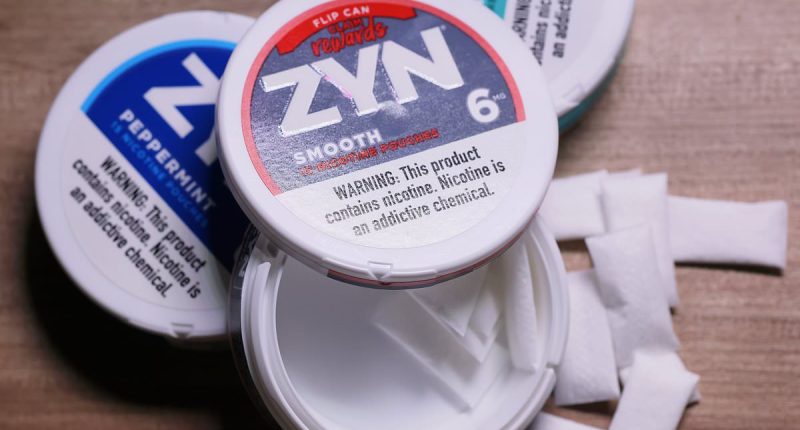Share this @internewscast.com
One day last August, a young man arrived at a busy hospital in Toronto, Canada, displaying what doctors later described as ‘bizarre’ behaviour.
Agitated, nothing he said made any sense. He was unable to sit upright in a chair – instead slumping on the floor – and was in a state of complete and total confusion.
Tests showed the 21-year-old also had a racing heart and his blood pressure was high, at around 184/99 (a healthy reading should be no more than 120/80).
But the mystery was soon solved when his brother, who’d accompanied him to hospital, revealed the patient had just spent 12 hours revising for an upcoming exam with the aid of a stimulant to keep him alert and boost his concentration: nicotine pouches.
These are tiny, pillow-shaped packages containing synthetic nicotine powder and flavourings, which are becoming increasingly popular with young adults in the UK who want the buzz that comes from nicotine without the toxic harm of the tobacco in cigarettes, or the chemicals that can go into vapes.
Studies suggest up to one in 50 people aged 18 to 24 in the UK are already using the pouches – while a survey by the Professional Footballers’ Association in 2024 revealed one in five players regularly use nicotine products such as pouches to help them stay mentally alert or to relax after training and matches.
Discreetly placed between the top lip and the gum, the pouches release a steady flow of addictive nicotine that’s absorbed into the bloodstream over a 20 to 60-minute period through the hundreds of tiny blood vessels in the tissue lining.
They are different from snus – a teabag-style product that also sits in the mouth and releases nicotine but is made with tobacco.

Political commentator Tucker Carlson holds a pack of nicotine pouches at the Republican National Convention in Wisconsin
Pouch fans claim a range of (some unproven) effects, from boosting powers of concentration, to curbing appetite to helping them relax. US TV host and political commentator Tucker Carlson, who last year launched his own brand of nicotine pouches, ALP, claims ‘it clears your thinking… and raises testosterone’. (Even the US secretary of health, Robert F Kennedy Jr, has been spotted apparently using a nicotine pouch.)
Meanwhile, social media posts suggest young adults are using pouches to lose weight (with some saying that it’s a cheap alternative to the weight-loss injection Wegovy). Nicotine is well known to be an appetite suppressant and the pouches – costing as little as £4.99 for a tin of 20 from high street retailers – are considerably cheaper than buying weight-loss drugs online.
Nicotine has always been considered the innocent party in cigarettes’ damaging effect on human health. It’s addictive, yes, but compared to some of the cancer-inducing chemicals in cigarettes, it is relatively benign.
However, the Toronto case shows it’s not completely harmless. Doctors found the patient had got through 15 pouches in a 12-hour period, flooding his system with high doses of nicotine.
He was kept in hospital for 24 hours and given powerful benzodiazepine drugs to calm his agitation, before making a full recovery.
But medics were so concerned that they published a report last summer in the journal Nicotine and Tobacco Research, highlighting the potential risk – ‘this is the first case of acute nicotine toxicity from nicotine pouch use’, they wrote. ‘These pouches are emerging as a novel way to use nicotine but present a serious risk of inadvertent overdose and harm.’
In January, the US Food and Drug Administration sanctioned the sale of Zyn – a nicotine pouch popular with those in their teens and 20s as a weight-loss aid – the first branded pouch to be approved there.
It’s marketed by Philip Morris International, the tobacco giant which has branched out into vapes and nicotine pouches as cigarette demand declines.

Professor of epidemiology John Britton says pouches are an excellent alternative for smokers looking to quit
And it’s not alone. British American Tobacco also has a pouch on the market called Velo, which comes in fruit and mint flavours, costing around £5 for 20.
Concerns about the pouches being a ‘gateway’ to smoking have led to them being banned in some countries, including France and the Netherlands; in others, such as Australia, they’re available only on prescription.
In the UK, because they do not contain tobacco, nicotine pouches can legally be sold to under-18s and are often placed near sweets in corner shops.
Yet, while an average cigarette has 10-12mg of nicotine, some pouches advertised in the UK have more than ten times as much, around 150mg – several times the amount permitted in e-cigarette liquids.
The UK Tobacco and Vapes Bill is expected to clamp down on sales of nicotine pouches and vapes to young people – but it’s not likely to take effect until January 2027. And some researchers have expressed alarm at how marketing for pouches is targeting young people on social media.
Experts at Orebro University in Sweden studied nearly 500 Instagram posts from one popular UK brand – Nordic Spirit – between 2019 and 2023. Researchers concluded in a report, published in the journal Nordic Studies on Alcohol and Drugs in December 2024, that the posts were often misleading, underplayed the dangers of nicotine and framed the pouches as ‘trendy lifestyle products… rather than as an alternative to smoking’.
They urged the Advertising Standards Authority to introduce tighter regulations to protect young people ‘from exploitation’.
Another study, by the University of British Columbia in Canada, published in January in Nicotine and Tobacco Research, found TikTok videos promoting Zyn pouches as ‘fun and safe’ – rather than as a tool to stop smoking – and rarely mentioned the risks of nicotine addiction.

Discreetly placed between the top lip and the gum, pouches release a steady flow of addictive nicotine
Yet evidence is emerging that the pouches may be harmful.
In March, experts at the University of Gothenburg reported that regular use can lead to painful gum ulcers and inflammation. Chronic exposure to a corrosive chemical, sodium carbonate – added to increase the absorption of nicotine – has been blamed.
Research is also emerging about the effects of nicotine – including the synthetic kind. Its effect on the brain is well known – within 20 seconds of inhaling it, it triggers the release of chemicals such as dopamine which is associated with pleasure.
But it also increases heart rate, causes a spike in blood pressure and makes blood vessels constrict. This is because nicotine also triggers the release of the hormone adrenaline.
And some experts fear nicotine could even have harmful neurological effects in young people.
Dr Marina Picciotto, a neuroscientist at Yale University in the US, has been studying the impact that it can have on the developing brain – whether from smoking, vaping or pouches.
She told Good Health: ‘Nicotine gets to the brain from pouches and alters the signalling of the neurotransmitter, acetylcholine [a chemical vital for learning and memory]. We know from studies of adolescent smoking that this can result in long-term changes in brain function and connectivity.’
Indeed, a US study published in March in Substance Use and Misuse revealed that 14-year-olds who regularly used nicotine pouches were two-and-a-half times more likely to achieve poorer school grades than their peers who did not use them.
The researchers warned: ‘The brain is not fully developed in middle/high school students, therefore many substances, including nicotine, have the potential to affect it, impair learning and hinder academic performance.
‘Nicotine in pouches is an emerging, heavily marketed, explicit public health concern.’
And there may be links with some types of cancer.
Numerous studies show that nicotine can fuel the growth of pancreatic cancer cells in mice – though it’s not clear if it does the same in humans – while a mouse study published in April in the journal Acta Pharmacologica Sinica found that nicotine can cause mutations in a gene called EZH2, which increases the spread of non-small cell lung cancer (the most common type of lung cancer in the UK).
John Britton, a professor of epidemiology at Nottingham University and former chairman of the Royal College of Physicians Tobacco Advisory Group, says pouches are an excellent alternative for smokers wishing to quit.
He told Good Health: ‘But if you don’t smoke, then why would you want to risk becoming addicted to nicotine?
‘It’s true that it’s an appetite suppressant – that’s one of the reasons smokers who quit often gain weight.
‘But the effect is quite modest – and if you want to lose weight safely, it would be much better to do it by altering your diet.’
A spokesman for British American Tobacco said it had repeatedly called on the UK Government to ban the sale of pouches to under 18s and introduce a cap on their nicotine content – adding: ‘We are disappointed it has taken them so long.’ Philip Morris International did not respond to a request for comment.














